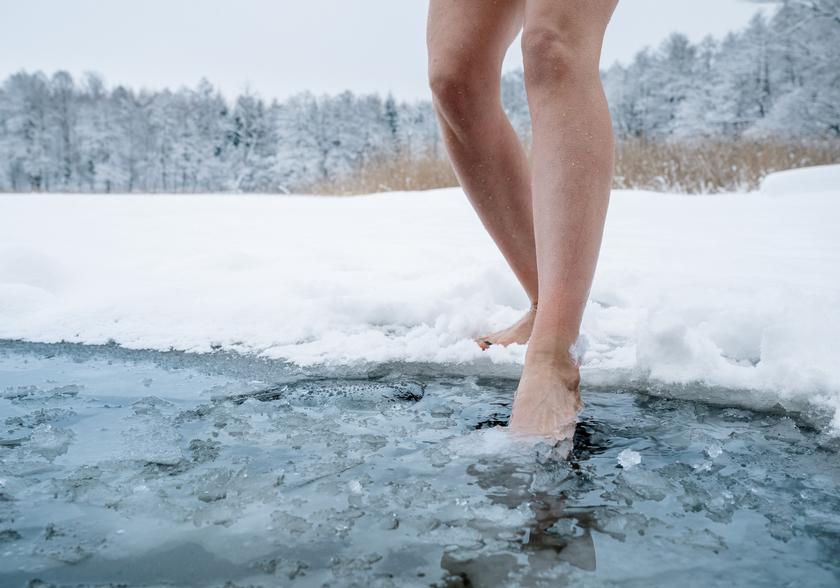Does the Body Benefit from a Cold Plunge?

By: Katie McCalllum
My first exposure to cold plunges was seeing a picture of a friend floating in a lake on a cold January day. To be honest, I was a little taken aback.
I was familiar with athletes sitting in ice baths after practices or games, of course. I'd also jumped in a cold pool myself as a kid. What I didn't know was that there might be reasons to submerge your body in extremely cold water beyond exercise recovery or a childhood dare.
She claimed her cold plunging was a wellness reset of sorts, great for improving everything from blood flow to immunity and sleep to mood, as well as reducing stress and chronic inflammation. I'll admit that I was a bit skeptical.
From celebrities now furnishing their homes with cold plunge pools to countless TikTok videos of people doing polar bear dips in an ocean or lake, I've seen more and more people doing cold plunges since. I've also learned the other names for it, including cold water immersion, polar plunging and cold shock therapy.
It's enough of a phenomenon that it's time to answer the question: Does the body really benefit from a cold plunge? For an informed response, I talked to Dr. Sadeer Al-Kindi, a preventive cardiologist at Houston Methodist.
What does cold water do to your body?
"When you plunge into extremely cold water, your body undergoes several physiological responses," says Dr. Al-Kindi. "There's an initial gasp reflex, followed by rapid, uncontrollable breathing, an increase in heart rate and a rise in blood pressure."
This is known as the cold shock response.
"Cold water plunging also affects blood vessels, causing vasoconstriction in an effort to help preserve energy," says Dr. Al-Kindi. "This can work to reduce blood flow to areas of inflammation in the body."
This altered blood flow doesn't last forever. When you get out of the water, your body naturally pushes blood back to areas that were submerged.
Cold plunge benefits: What's known?
Dr. Al-Kindi starts with a disclaimer. He says our understanding of the short- and long-term impact of cold immersion remains limited.
"Many insights have been obtained from long-term cold water swimmers, but this is not highly applicable to short-term cold plunges," says Dr. Al-Kindi.
Additionally, the practice of cold plunging isn't strictly defined. A lot of variables can arise, including differences in temperature, duration and individual health factors that may affect how a person responds to cold water.
That said, a few small studies assessing cold plunging have shown some benefits.
"Repeated cold immersion may reduce insulin resistance," says Dr. Al-Kindi. "This, in theory, can have benefits for reducing the risk of type 2 diabetes, though this outcome remains to be elucidated."
Other studies have found that cold plunges can reduce inflammation to provide quicker recovery of muscle strength, power and neuromuscular function.
"As mentioned, the cold water constricts blood vessels," explains Dr. Al-Kindi. "This slows blood flow and relieves some of the swelling and soreness you feel in your muscles after a long exercise."
It's why many athletes brave sitting in an ice bath after a strenuous workout.
Beyond these benefits, though, not much else is known about cold plunging. This means it remains unproven whether the practice actually delivers on its overall wellness claims — that it produces better sleep, stress relief, a stronger immune system and lower levels of chronic inflammation.
Can cold plunging ever be dangerous?
While you might be using a cold plunge as a way to better your health, the practice isn't without risks. Some are a matter of life and death.
"The sudden immersion in cold water can cause a person to drown if they involuntarily gasp while their head is submerged," explains Dr. Al-Kindi. "The shock also places stress on the heart and makes it work harder, especially in those with preexisting heart disease."
You should avoid cold plunges if you have one of the following heart-related conditions:
- Heart disease
- High blood pressure
- Diabetes
- Peripheral neuropathy
- Poor blood circulation, due to issues like deep vein thrombosis (DVT), varicose veins, Raynaud's disease, etc
- Venous stasis
- Cold agglutinin disease
"It's always recommended to consult a healthcare provider before starting any new health practice," recommends Dr. Al-Kindi.
If you do decide that cold plunges have a place in your wellness routine and your doctor has given you the all-clear, be sure the water source you choose isn't too cold — 50°F is more than cold enough. You'll also want to keep your sessions short, about five to ten minutes. After the body adapts and the shock response ends, cold water doesn't provide much benefit anyway.

















